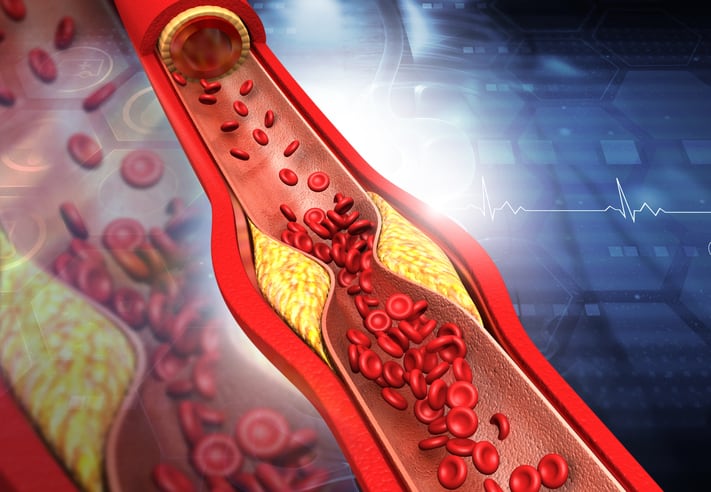Cardiovascular
Exploring Non-HDL Cholesterol as a Predictor of Cardiovascular Events
A large population study has revealed that higher non-HDL cholesterol levels were associated with higher risks for cardiovascular events.
Epidemiologic, genetic, and clinical intervention studies have provided extensive evidence on how the pathophysiology of cholesterol-rich LDL is directly implicated in the development of atherosclerotic cardiovascular disease (ASCVD). Most dyslipidemia guidelines recommend treating LDL cholesterol as a primary target and non-HDL cholesterol as a secondary goal. Large randomized controlled trials have demonstrated a consistent relationship between reducing LDL cholesterol levels and decreasing ASCVD risk. As such, most guidelines recommend lowering LDL cholesterol levels to prevent ASCVD.
Three drug classes—statins, PCSK9 inhibitors, and cholesterol-absorption inhibitors—have been shown to successfully lower LDL cholesterol levels and prevent ASCVD and relative death in clinical research. Although patients in these studies achieved their LDL cholesterol goal, there was substantial uneliminated dyslipidemia-related residual risk. Recent data provide evidence of a causal relationship between ASCVD and other apolipoprotein B-containing lipoproteins, including very low-density lipoproteins and their remnants, intermediate density lipoproteins, and lipoprotein(a).
Using a Large-Scale Dataset to Evaluate the Cholesterol-CVD Relationship
Studies focusing on the association between non-HDL cholesterol levels and CVD are limited. “Although research has established a positive link between LDL cholesterol levels and ASCVD risk, few studies have focused on non-HDL cholesterol levels and ASCVD risk,” says Sangmo Hong, MD, PhD. For a study published in the Journal of Lipid and Atherosclerosis, Dr. Hong and colleagues evaluated the relationship between non-HDL cholesterol, LDL cholesterol, and cardiovascular disease (CVD) using a large-scale dataset from the National Health Information Database (a database of healthcare use and screening that contains sociodemographic and mortality information for the entire population of South Korea).
The retrospective observational cohort study comprised more than 3.8 million adults aged 20 and older from 2009 to 2018. Participants were divided into LDL cholesterol and non-HDL cholesterol quartiles. Outcome variables included stroke, myocardial infarction (MI), and both MI and stroke. A Cox proportional hazards regression analysis was used to analyze all outcomes while controlling for baseline covariates, including age, sex, smoking, alcohol consumption, regular exercise, BMI, diabetes, hypertension, and statin use.
Higher Non-HDL Cholesterol Linked to Higher CVD Risk
At an average follow-up of 9.1 years, researchers found that stroke was diagnosed in 1.55% of the study population, MI was diagnosed in 0.81%, and both stroke and MI were diagnosed in 2.29%. Compared with participants in the lowest quartile, patients in the highest non-HDL cholesterol quartile had a higher risk for stroke, MI, and both stroke and MI. “In short, patients with higher non-HDL cholesterol levels were more likely to have a higher risk for CVD than those with higher LDL cholesterol,” says Dr. Hong.
In a multivariate-adjusted model for age, sex, alcohol consumption, regular physical activity, BMI, diabetes, hypertension, and statin medication, there was a significant and progressive increase in the risk for cardiovascular events with increasing non-HDL cholesterol levels (Figure). MI and stroke had a J-shaped association with LDL cholesterol levels.
The study team’s observed links between non-HDL cholesterol levels and study outcomes were constant across subgroups according to age, sex, diabetes, hypertension, and statin use after multivariate adjustment, except for the association between LDL cholesterol levels and stroke in women. All patient subgroups in the highest quartile of non-HDL cholesterol had a higher risk for cardiovascular events compared with all other quartiles of non-HDL cholesterol.
Non-HDL Cholesterol Might Predict Future CVD Events
According to the study authors, these results should be interpreted with caution. Due to the limitations of observational design, the study does not establish a causal relationship between non-HDL cholesterol levels and CVD events, Dr. Hong says; however, it does indicate that high non-HDL cholesterol levels could be a more significant predictor of future cardiovascular events than LDL cholesterol levels.

